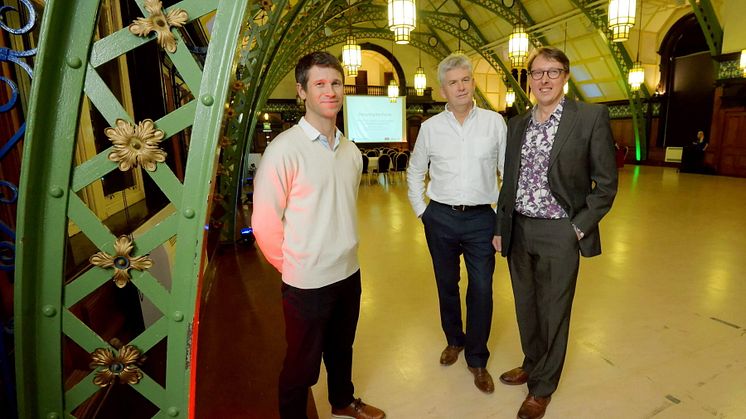
Press release -
Northumbria academic receives prestigious international award for alcohol research
A Northumbria University academic, whose research has had a major impact on public health policies around the world, has received a prestigious award for his contribution to alcohol studies.
Nick Heather, an Emeritus Professor of Alcohol and Other Drug Studies in Northumbria University’s Department of Psychology, has been chosen as this year’s winner of the 2017 Jellinek Award, established in memory of Dr. E. M. Jellinek's great contribution to the field of alcohol studies.
Each year the Jellinek Memorial Award recognises a scientist from any country around the world who has made an outstanding contribution to the advancement of knowledge in the alcohol/alcoholism field. The prize includes $5,000 (Canadian) and a bust of E.M. Jellinek himself.
After working as a clinical psychologist in the NHS, Professor Heather developed the Addictive Behaviours Research Group at the University of Dundee and in 1987 became founding Director of the National Drug and Alcohol Research Centre at the University of New South Wales.
Professor Heather returned to the UK in 1994 as Consultant Clinical Psychologist at the Newcastle City Health NHS Trust and as Director of the Centre for Alcohol and Drug Studies.
He took up his present position at Northumbria University on retirement from the NHS in 2003. Professor Heather has a long-standing interest in research on addictive disorders, with an emphasis on the treatment of alcohol problems. He has accumulated over 500 publications, including books, book chapters, articles in scientific journals, reports and other types of publication, mostly in the field of addictions.
Professor Heather expressed his “great honour” at receiving such a globally acclaimed accolade.
“I am absolutely delighted to receive this award and I regard it as a great honour,” he said. “It is a tribute to my work; however, I hope that a lot of other people who have influenced my ideas and those I have worked with over the years will see it as a tribute to their achievements as well.”
Nick Heather has published a number of books, which present evidence, and theories intended to challenge the notion that alcoholism is best seen as a disease.
In 1981 he co-authored the book Controlled Drinking, which looked at a large number of studies that found some dependent drinkers were able to return to problem-free drinking. He followed this up with the book Problem Drinking, which explored alcohol problems and their interpretation and repeatedly set out evidence to contest the disease concept of alcoholism.
Speaking about his research, Professor Heather added: “I began my research 40 years ago and have maintained a critique of the notion of alcoholism, particularly as a disease. I have also challenged the idea that the only solution to an alcohol problem is to become abstinent from alcohol altogether.
“Nobody is suggesting that alcohol dependence isn’t a very serious issue and I’m certainly not suggesting that in severe cases abstinence may not be necessary for recovery – but the evidence is quite clear that most people with less severe problems can reach a stable situation by drinking in a harm-free way.”
Professor Heather was instrumental in the development of the “brief intervention” approach to non-dependent problem drinkers, which is now a key alcohol public health policy in many countries across the globe, including the UK, Sweden, Finland and the US. Delivered by GPs and other frontline professionals, it works by identifying people who are drinking too much for their own health and welfare and offering them some advice on their drinking habits, helping them to cut down and drink in a safer way.
Professor Harold Kalant, Jellinek Memorial Fund President, said: “The Jellinek Fund Board of Directors is delighted to offer its congratulations to Professor Heather for this richly deserved honour. He has made many outstanding contributions to the field of alcohol studies, including the use of brief interventions in the treatment of alcohol problems. This year’s Jellinek Award, however, specifically recognises the great importance of his research and conceptual contributions to the understanding of the interaction of individual and socio-cultural factors in the origin, management and prevention of alcoholism. Altogether a remarkable career.”
Topics
Northumbria is a research-rich, business-focused, professional university with a global reputation for academic excellence. To find out more about our courses go to www.northumbria.ac.uk
If you have a media enquiry please contact our Media and Communications team at media.communications@northumbria.ac.uk or call 0191 227 4571.











